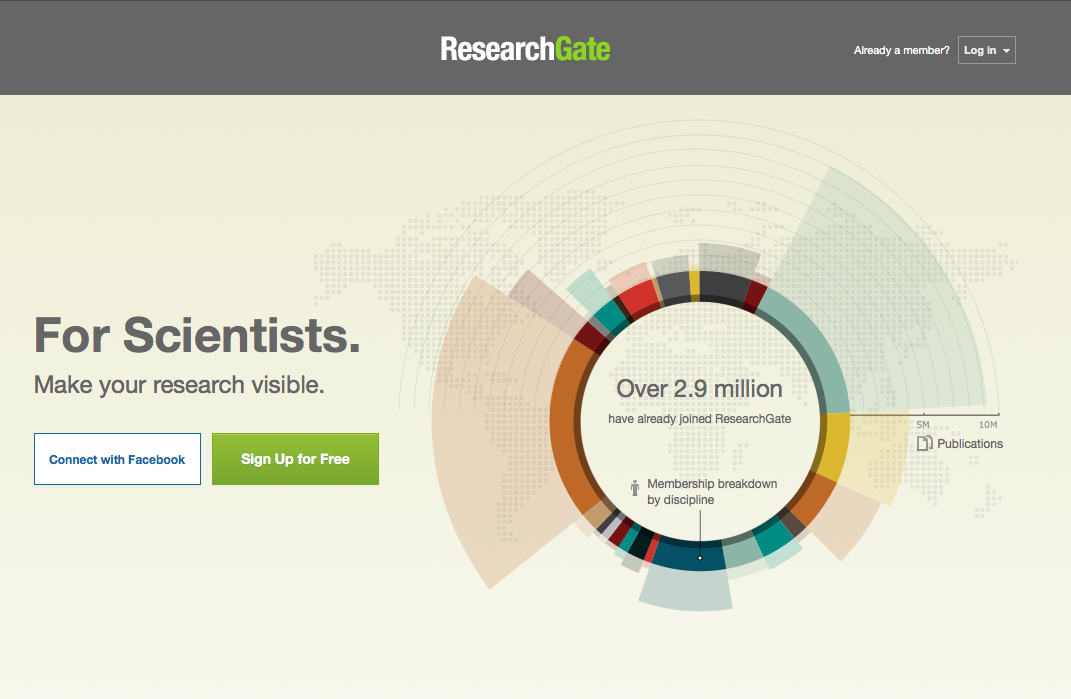 Social networking for scientists has been tried before, but not until recently have we seen investors placing big bets in this area. Earlier this year, the academic networking site Mendeley was acquired by scientific publisher Elsevier for somewhere in the ballpark of $70 million. And today brings a new data point: Berlin-based ResearchGate, a site designed to facilitate collaborations and data sharing among scientists around the world, has raised $35 million in a series C round from investors including Bill Gates.
Social networking for scientists has been tried before, but not until recently have we seen investors placing big bets in this area. Earlier this year, the academic networking site Mendeley was acquired by scientific publisher Elsevier for somewhere in the ballpark of $70 million. And today brings a new data point: Berlin-based ResearchGate, a site designed to facilitate collaborations and data sharing among scientists around the world, has raised $35 million in a series C round from investors including Bill Gates.
ResearchGate sprang into existence in 2008 when Ijad Madisch, a scientist in Boston, was having trouble finding research partners outside his own laboratory. Together with Sören Hofmayer and Horst Fickenscher, he founded the social networking site and has spent the last five years building it into the kind of tool that can be truly useful for scientists in the same position.
While social networking has upended how business happens in other industries, the centuries-old traditions of the scientific field have largely blocked this kind of change. Sure, scientists sign up for Facebook and LinkedIn like anybody else. But use a social networking tool to facilitate research, find partners, and share data that hasn’t yet been published? That’s been a tough sell in the hyper-competitive, highly specialized scientific community.
But ResearchGate’s Madisch believes he is making inroads—and that his latest round of funding, along with its big-name investors, is proof of that. The site boasts 2.8 million users, and features a number of tools and capabilities designed to lure scientists. Madisch knows that scientists are unlikely to share data that could be included in a valuable peer-reviewed publication, so instead he encourages users to share data from failed experiments that will never be submitted for publication anyway. There’s a lot less possessiveness around that data, and Madisch contends that failures are just as important as successes in helping people understand what works under certain circumstances.
Another widget calculates a scientist’s reputation score based on interactions within ResearchGate; this number offers an alternative way to look at any scientist’s impact within the field beyond the current gold standard, which simply associates a person’s value with the reputation of the journals he or she gets published in.
What’s most important to Madisch, though, is the site’s ability to connect scientists around the world and allow better research to happen faster. He cites the example of a young child who died from an unknown cause in Nigeria; a local doctor sent samples to a scientist in Italy he found on ResearchGate, and together they identified a new pathogen responsible for the child’s death. Further analysis was conducted by a Dutch researcher, also found through the networking site. For Madisch, this anecdote embodies the ResearchGate mentality: The more you collaborate, the more successful you’ll be.
In general, Madisch’s strategy for scientific social networking is to bet on younger researchers who are more comfortable with networking and social media in general. He says that this generation is far more likely to sign up for ResearchGate and make full use of its features, while scientists who have been entrenched in the culture for decades are more skeptical of any kind of social tool. These scientists are welcome, of course, but Madisch isn’t spending his time trying to convert naysayers. Instead, he is focused on adding more functions to the existing tool, for which the new funding will be critical. The $35 million will help build out the network, add features, and provide ways to monetize the site. “This will speed up scientific innovation and scientific progress tremendously,” Madisch says.
Whether that gamble pays off is anyone’s guess, but as government grant funding tightens, it is imperative to be trying new models to make science more effective and efficient. This funding round is a significant boon for ResearchGate and may be an early sign that the power of the internet as an industrial game-changer is finally coming to the scientific realm.
With $35 Million and a Fan in Bill Gates, ResearchGate Tackles Social Networking for Scientists
Social networking for scientists has been tried before, but not until recently have we seen investors placing big bets in this area. Earlier this year, the academic networking site Mendeley was acquired by scientific publisher Elsevier for somewhere in the ballpark of $70 million. And today brings a new data point: Berlin-based ResearchGate, a site designed to facilitate collaborations and data sharing among scientists around the world, has raised $35 million in a series C round from investors including Bill Gates.

















